- Home
- Madeleine L'engle
Many Waters Page 23
Many Waters Read online
Page 23
Higgaion reached with his trunk to touch his ear. The scarab beetle was not there.
Another drop of rain fell. It was a quiet, beginning rain, with occasional droplets. No thunder or lightning.
Sandy asked the sky, "Is God really doing this? Causing a flood to wipe everybody out?"
Dennys raised his face to the sky. The stars were not visible, hidden by thick veils of clouds, but it seemed that he could still hear their chiming, dim but reassuring. "Whenever there's an earthquake, or a terrible fire, or a typhoon, or whatever, everybody gets it. Good people get killed as well as bad."
Sandy was wriggling his toes against Higgaion's shaggy grey flank. "Well. Everybody dies. Sooner or later."
"Even stars die," Dennys added.
"I don't like entropy," Sandy said. "The universe winding down."
"I don't think it is winding down," Dennys contradicted. "I think it's still being birthed. Even the flood is part of the birthing."
"I don't understand." Sandy's voice was flat. "Everybody knows that entropy--"
"Everybody doesn't. And entropy is in question, anyhow. Remember, we had that in science last year. There's no such thing as an unbreakable scientific rule, because, sooner or later, they all seem to get broken. Or to change."
"Grandfather Lamech said that these are last days." The occasional slow drops of rain made Sandy on edge, and argumentative.
Another splash of rain touched Dennys's face, muting the stars. "There have been many times of last days," he said, "and they mark not only endings but beginnings."
"Is there a pattern to it all?" Sandy demanded. "Or is it all chaos and chance?"
"What do you think?" Dennys asked.
Selah had come to lie beside Higgaion, and Sandy reached to scratch her with the toes of his other foot. "Did we come here, to Yalith, to Noah, by chance?"
Dennys wiped his face with the palm of his hand. "No. I don't think so."
Sandy said, "The ark is finished. Yalith is with Grandfather Enoch. And perhaps with Grandfather Lamech. What was it Grandfather said? We know little about such things..."
There was a radiance in the air, and Adnarel stood before them.
"Oh, Adnarel." Sandy leapt up. "I need to talk to you about particle physics and quantum leaps."
Adnarel sat beside them, listening.
"So," Sandy concluded, "if you could go to our time and place and call the unicorns to you there, you could tesser us home."
"It does not sound impossible," Adnarel said. "It is consistent with our knowledge of energy and matter. I will talk with the other seraphim." As he turned to go, he said, "Do not stray far from the tent."
"The nephilim," Dennys agreed. Then, in a louder voice, "We will not stray. It is just that somehow we are not sleepy."
Adnarel paused. "Your love for Yalith, and hers for you, is, and therefore it always will be." And then he was gone.
They smelled Tiglah before they saw her. Quickly they sprang to their feet and ran to the tent flap, which was half open.
"Oh, don't go, please don't go!" Tiglah cried. "I'm alone, I promise you."
Tiglah's promises meant little. They stood warily by the tent flap, watching her as she approached. But there was nobody with her, neither father and brother, nor nephilim.
"It's starting to rain," she said. "We never have rain except in the spring. Did Noah really build this big boat because he thinks there's going to be more rain than we've ever seen before?"
Sandy nodded.
"Anah is my sister. Would there be room for me on the ark?"
"There is not room for Sandy and me," Dennys said.
"Then what are you going to do?"
"We're not sure." Sandy was cautious. "We hope to go home."
"I don't like this rain." Tiglah sniffled. "It's cold and wet."
"Rofocale will take care of you," Sandy said.
"Oh, he will, won't he! I'd better go find him. It's very nice to have known you."
"Thanks for nothing," Sandy said rudely.
"Ditto," Dennys echoed.
"You're not blaming me for my father and brother, are you?"
"Perhaps not for your father and brother," Sandy said, "but for doing whatever Rofocale tells you, yes."
"So go to him," Dennys urged, although he did not have much faith that the nephilim cared enough about any human being to be willing to help unless it was convenient.
"I still think it's nice to have known you," Tiglah said.
"I wish I could have known you better. I mean, really known you."
"Sorry, Tiglah," Sandy said. "You are a great deal older and a great deal more experienced than we are."
"I could teach you--"
"No, Tiglah. The timing isn't right."
"Goodbye, then," she said.
"Goodbye," the twins echoed.
Japheth came to them. "I'm worried about you."
Sandy was still looking after Tiglah's retreating form. "Don't worry, Jay. We'll be all right."
"How?" Japheth demanded. "You know we can't take you on the ark."
"We know," Dennys agreed. He looked up at the clouds, which occasionally let a drop of rain fall. Tried to listen for the hidden stars.
"Can you get home?" Japheth asked. "To wherever you came from?" He, too, looked at the sky, shook his head as though baffled by silence.
"We're going to try," Sandy said. "Don't worry about us. You have enough to do, collecting all the animals and food and fodder and grain and everything."
Japheth nodded. "Perhaps--"
"Perhaps what?" Sandy asked.
Japheth rubbed his broad hand across his face, wiping away tears. "Oh, twins--" He rushed at them, and they flung their arms about him and the three of them rocked back and forth, holding one another.
Oholibamah went, just before dawn, to Mahlah's low white dwelling.
Mahlah was alone, nursing the baby. It was indeed a large baby, drinking greedily, and Mahlah looked pale and fragile, but she crooned over the child while she fed it.
She looked up at Oholibamah and smiled in welcome. "It's good to see you, Oholi. Come in."
Oholibamah stood, looking down at Mahlah and the child. "Is Ugiel good to you?"
"He is very good." There was deep love in Mahlah's shadowed eyes.
"You're happy with him? Truly happy, as I am with Japheth?"
"Truly happy. Though Ugiel is Ugiel and Japheth is Japheth."
"He doesn't ever hurt you?"
"Never."
"He takes care of you?"
"Very good care. And he loves our baby."
"Good," Oholibamah said. "That's all I wanted to know." And she left Mahlah and went back to the tent she shared with Japheth.
The seraphim were gathered together as dawn suffused the desert with a soft pearly light. The clouds were thickening, and in the trees the birds sang more softly than usual, and the baboons' chatter was muted.
"It does look possible, I think," Adnarel said.
Alarid nodded. "We are not bound to this place and time. Two of us should go to the twins' world and call them back."
Admael asked, "Does it really need to be unicorns? I would feel safer if I could carry them."
Adnarel's eyes widened for a moment, then nearly closed in thought. "I do not think they could take the transition from matter to energy and then back again to matter. Even we find it tiring."
"But what about the unicorns?" Adnachiel, sometimes a giraffe, asked. "What happens when they go out?"
Adnarel said, "They are only when they are here. Or when they are there. But not in between. It is not quite the same thing as a transfer of matter and energy."
Alarid nodded. "They have to be observed in order to be."
"Believed in," Adnachiel agreed.
"It is a long distance," Admael said, "both in time and space."
"It is a risk," Adnarel agreed, "but one I think we must take."
"Why are they here at all?" asked Achsah, with wings the same soft gray as his
mouse fur.
"Do you think El sent them?" Admael suggested.
Adnarel spoke slowly. "I do not think El sent them. But neither did El prevent their coming."
"Are they part of the pattern?" Admael asked. "Is it right and proper for them to be here?"
Alarid looked up at the veiled sky. "Perhaps Aariel will have word when he returns from taking Yalith to the Presence. But I think, yes, that they are part of the pattern."
"The pattern is not set," Adnarel said. "It is fluid, and constantly changing."
"But it will be worked out in beauty in the end," Admael affirmed.
"Then you agree?" Adnarel asked. "We will try to help them to return to their own time and place in the way in which they have suggested?"
"We agree," affirmed the seraphim.
The air lightened slightly as the hidden sun lifted above the horizon. There was a faint spattering of applause from the baboons, who were confused by the clouds and the occasional drops of rain.
Despite the clouds which obscured the light of the last dim stars, the seraphims' ears were attuned to the song, although it was far away.
"Let us sing with them," Alarid suggested.
And the singing of the seraphim joined with the singing of the hidden stars, and the call of the invisible sun.
Sandy and Dennys slept fitfully. The rain had not really begun in earnest. But there was an occasional patter on the roof skins as a drop fell here, there. The three mammoths were curled into a ball at the foot of the twins' sleeping skins.
The morning songs of the oasis were softer than usual, but both boys roused from sleep and looked at each other. Nodded.
Quietly, they dressed in their clothes from home. Dennys was without the garments he had discarded after the garbage pit, but he pulled on his sweater and his lined jeans, feeling strange and constrained in clothes. The twins had become used to the freedom of being naked except for loincloths. Their winter clothes were hampering as well as hot.
They were careful not to disturb the sleeping mammoths. They looked across the tent to where Noah and Matred were still asleep. To the place which had been Yalith's and which was now empty.
Then they tiptoed out.
Adnarel was waiting for them. "It's best without goodbyes."
Dennys asked, "But you will say goodbye for us? And to Oholibamah and Japheth? And the others?"
"We will say goodbye," Adnarel said, and looked toward a clump of palms and palmettos. Admael and Alarid came out of the shadows and moved toward them, followed by Aariel, who had returned from his journey with Yalith.
"Now," Adnarel said, "we will call the unicorns."
"One more thing." Sandy held back. "You will take care of the mammoths?"
"We will take care of them. Unicorns!"
With a glimmer of silver, two unicorns solidified before them.
"Now," Adnarel said.
The two boys mounted the unicorns, sitting astride the silver backs, bathed in light from the horns.
"We leave you now," Adnarel said, "Admael and I. When we are in your time and place, we will call for the unicorns, and for you."
"You'll recognize it when you get there?" Sandy asked anxiously.
"You have given us very good parameters."
Alarid and Aariel each stood by one of the unicorns. When a drop of rain touched the light of their brilliant horns, it hissed slightly.
The unicorns crossed the oasis and moved onto the desert, Alarid and Aariel running along with them.
When they reached Aariel's great rock, the two seraphim stopped and looked at the unicorns, then at the twins.
"Are you ready?" Alarid asked.
"Ready," Dennys said.
Aariel slapped the two silver rumps, and the unicorns took off across white sand and rock. In his golden voice he cried, "Unicorns! Go home!"
Dennys felt a wave of sleep wash over him, as the rain and the unicorns quickened. Sandy, too, felt his mind softly closing. The rain was a curtain of silver.
"Alar--" Sandy murmured.
"Aar--" Dennys started.
The unicorns and the twins flickered like candles and went out.
Two unicorns in an old stone lab connected to a white clapboard farmhouse were a strange sight. So were two tall, bright-winged seraphim.
The twins looked around. Aside from the unicorns and the seraphim, everything was as usual. Wood still burned brightly in the stove. The smell of stew--of boeuf bourguignon--was fragrant over the Bunsen burner. The odd-looking computer was where it had been when they punched into it.
Adnarel was sitting in their mother's reading chair, his golden wings drooping behind it. Admael was peering into one of her complex microscopes, hunching his pale blue wings.
"Do you believe in unicorns?" Adnarel's azure eyes were smiling.
"How was the ride?" Admael, too, smiled, though both seraphim seemed very relieved.
The outside door banged.
Adnarel rose swiftly from the chair. Admael turned from the microscope. The twins stiffened.
Their mother's voice called, "Twins! Are you home?"
"Oh, oh," Sandy said. "We'd better get the unicorns out of here."
"They'll go as soon as they aren't believed in," Adnarel said.
Dennys exclaimed, "But Meg and Charles Wallace believe in unicorns!"
Admael asked, "And in seraphim?"
"And we're not supposed to be in the lab anyhow, with an experiment in progress." Sandy looked anxiously at Adnarel.
"Never fear," the seraph said. "You are all right?"
"Until Mother finds us in here."
Dennys added, "Looking the way we do, all sunburned."
"Compared with some of your other problems--" Admael started.
Their mother's voice called out again. "Twins! Where are you?"
"No farewells," Adnarel said. He glanced at Admael, then put both strong, long hands on Dennys's head. Admael followed suit with Sandy. Both boys felt, rather than a sense of pressure, a sense of the tops of their heads lifting, almost as the animal hosts lifted to become seraphim. And then each twin was staring at a normal winter twin, skins not darkened by the desert sun, hair not bleached almost white.
Sandy glanced briefly at Dennys's still bare feet, started to speak, then stopped as Adnarel held up his hand.
"Many waters--" The seraph reached out and clasped a unicorn horn. The light from the horn flooded back into the seraph's hand, through his body, his wings, until he was streaming with light. Admael, too, was filled with flowing light.
"Cannot quench--" he seemed to be saying. Light blazed fiercely, blinding the twins. Then the brilliance faded.
Unicorns and seraphim were gone.
Brown-haired, winter-skinned twins stared at each other.
Mrs. Murry opened the door to the lab. Behind her, Meg and Charles Wallace peered in, curiously.
"Sandy. Dennys. What are you doing here? Didn't you see the sign on the door?" She sounded extremely displeased.
"We didn't actually see it," Sandy started.
"We just came to get the Dutch cocoa," Sandy explained.
"Look," Meg said, "it's out here on the floor, by the kitchen door. Lucky it didn't spill."
"We were just going to make some," Sandy said. "Shall we make enough for you three?"
"Please," their mother said. "It's turning bitter cold. But, Sandy, Dennys, I beg you, don't go into the lab when you're asked not to. I hope you didn't touch anything you shouldn't have."
Sandy said, slowly, "It all depends. But I don't think we touched anything we shouldn't have, do you, Dennys?"
"Under the circumstances, no," Dennys said.
"Why are your feet bare, Den?" Charles Wallace asked.
"Good heavens!" Mrs. Murry exclaimed. "Put something on your feet this second, Dennys Murry, before you catch cold."
Meg opened the kitchen door, and there was the familiar odor of fresh bread, apples baking in the oven, and warmth, and brightness, and all the reassurance of
home.
As they followed the others in, Sandy whispered to Dennys, "I'm very glad the kitchen is all here. But you know what--I'm homesick."
"We probably always will be, a little," Dennys agreed.
"Well." Sandy straightened up. "As soon as we have our birthdays, we can get our driver's licenses."
"And about time," Dennys said. "Now let's make that cocoa."
What did you want to be when you grew up?
A writer.
When did you realize you wanted to be a writer?
Right away. As soon as I was able to articulate, I knew I wanted to be a writer. And I read. I adored Emily of New Moon and some of the other L. M. Montgomery books and they impelled me because I loved them.
When did you start to write?
When I was five, I wrote a story about a little "gurl."
What was the first writing you had published?
When I was a child, a poem in CHILD LIFE. It was all about a lonely house and was very sentimental.
Where do you write your books?
Anywhere. I write in longhand first, and then type it. My first typewriter was my father's pre-World War One machine. It was the one he took with him to the war. It had certainly been around the world.
What is the best advice you have ever received about writing?
To just write.
What's your first childhood memory?
One early memory I have is going down to Florida for a couple of weeks in the summertime to visit my grandmother. The house was in the middle of a swamp, surrounded by alligators. I don't like alligators, but there they were, and I was afraid of them.
What is your favorite childhood memory?
Being in my room.
As a young person, whom did you look up to most?
My mother. She was a storyteller and I loved her stories. And she loved music and records. We played duets together on the piano.
What was your worst subject in school?
Math and Latin. I didn't like the Latin teacher.
What was your best subject in school?
English.
What activities did you participate in at school?
I was president of the student government in boarding school and editor of a literary magazine, and also belonged to the drama club.
Are you a morning person or a night owl?
Night owl.
What was your first job?
Working for the actress Eva La Gallienne, right after college.
What is your idea of the best meal ever?

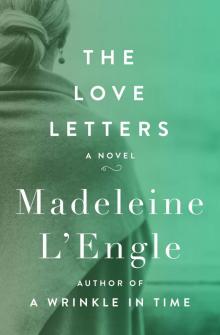 Love Letters
Love Letters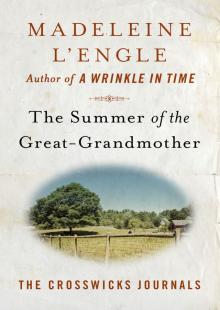 The Summer of the Great-Grandmother
The Summer of the Great-Grandmother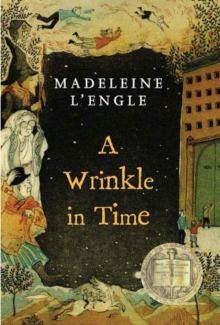 A Wrinkle in Time
A Wrinkle in Time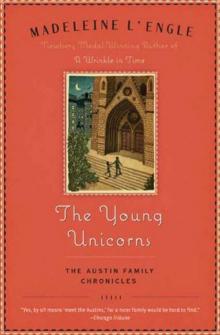 The Young Unicorns
The Young Unicorns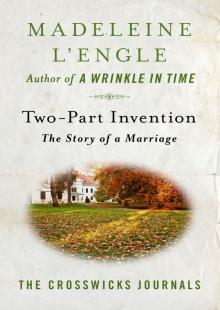 Two-Part Invention: The Story of a Marriage
Two-Part Invention: The Story of a Marriage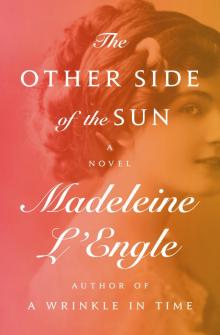 The Other Side of the Sun
The Other Side of the Sun A House Like a Lotus
A House Like a Lotus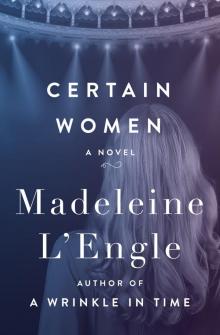 Certain Women
Certain Women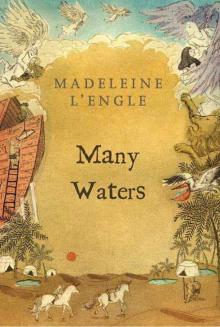 Many Waters
Many Waters Camilla
Camilla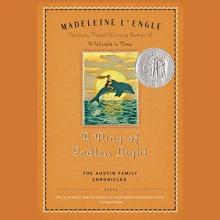 A Ring of Endless Light
A Ring of Endless Light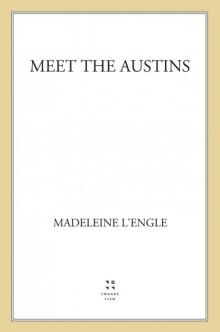 Meet the Austins
Meet the Austins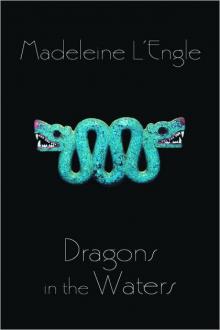 Dragons in the Waters
Dragons in the Waters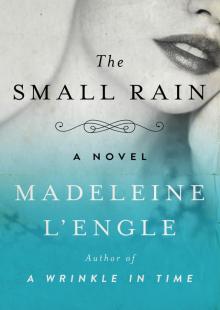 The Small Rain
The Small Rain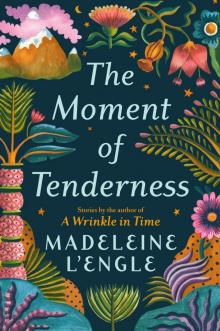 The Moment of Tenderness
The Moment of Tenderness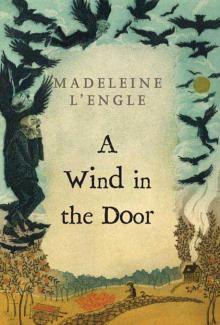 A Wind in the Door
A Wind in the Door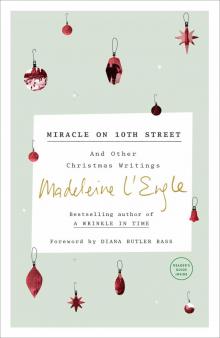 Miracle on 10th Street
Miracle on 10th Street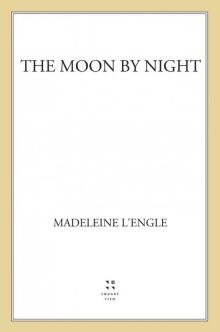 The Moon by Night
The Moon by Night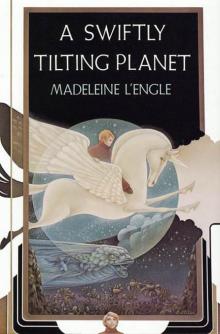 A Swiftly Tilting Planet
A Swiftly Tilting Planet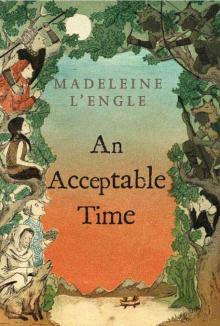 An Acceptable Time
An Acceptable Time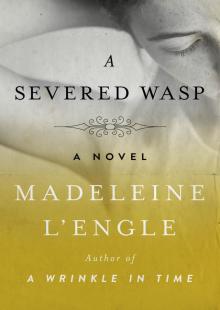 A Severed Wasp
A Severed Wasp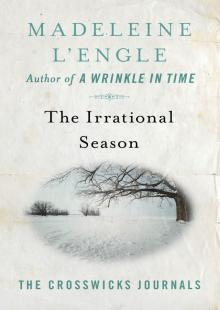 The Irrational Season
The Irrational Season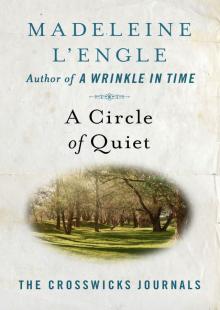 A Circle of Quiet
A Circle of Quiet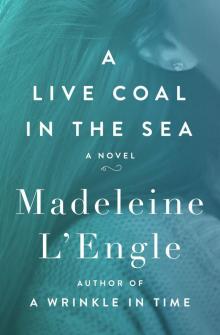 A Live Coal in the Sea
A Live Coal in the Sea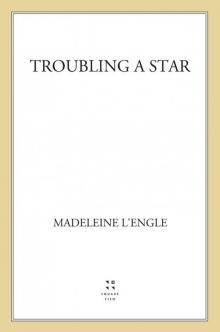 Troubling a Star
Troubling a Star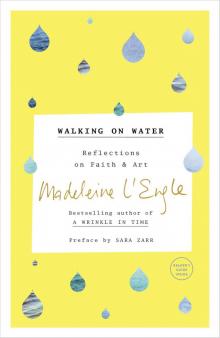 Walking on Water: Reflections on Faith and Art
Walking on Water: Reflections on Faith and Art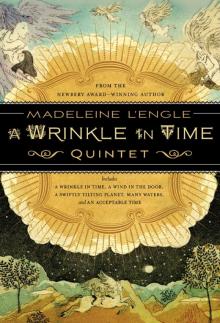 A Wrinkle in Time Quintet
A Wrinkle in Time Quintet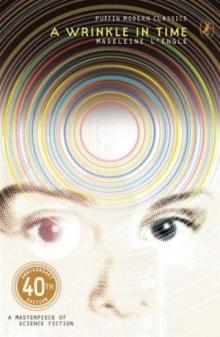 Wrinkle in Time
Wrinkle in Time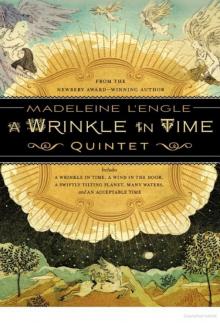 The Wrinkle in Time Quintet
The Wrinkle in Time Quintet Intergalactic P.S. 3
Intergalactic P.S. 3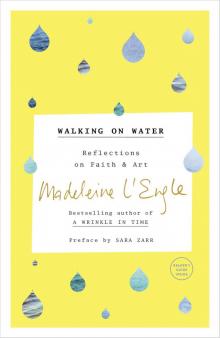 Walking on Water
Walking on Water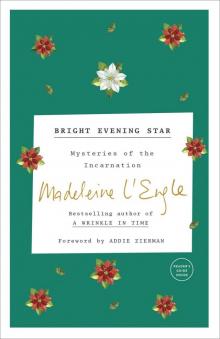 Bright Evening Star
Bright Evening Star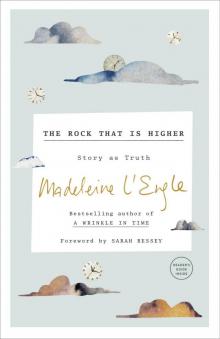 The Rock That Is Higher
The Rock That Is Higher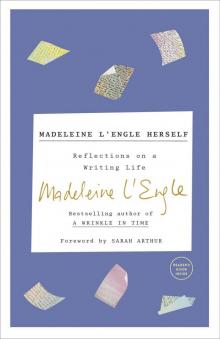 Madeleine L'Engle Herself
Madeleine L'Engle Herself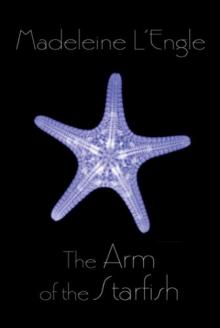 The Arm of the Starfish
The Arm of the Starfish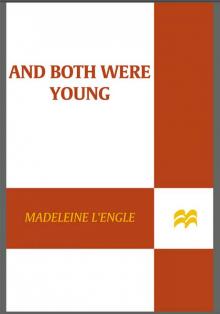 And Both Were Young
And Both Were Young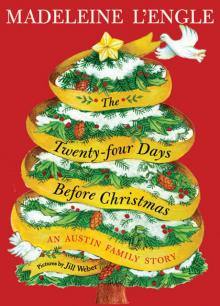 The Twenty-four Days Before Christmas
The Twenty-four Days Before Christmas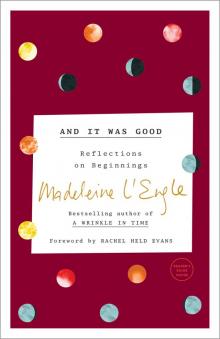 And It Was Good
And It Was Good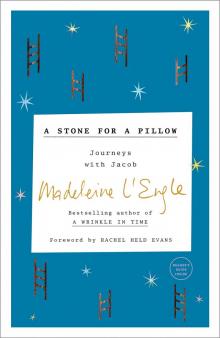 A Stone for a Pillow
A Stone for a Pillow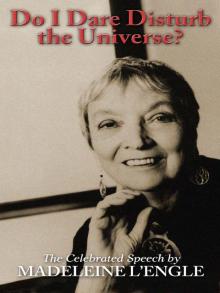 Do I Dare Disturb the Universe?
Do I Dare Disturb the Universe?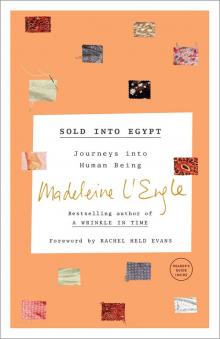 Sold into Egypt
Sold into Egypt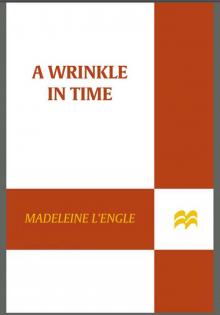 A Wrinkle in Time (Madeleine L'Engle's Time Quintet)
A Wrinkle in Time (Madeleine L'Engle's Time Quintet)